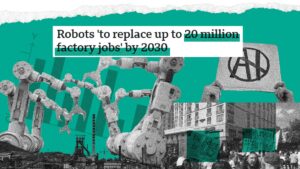- By Muhammad Ziyad Sheikh
THE SELF-AWARENESS OF AI
A Double-Edged Sword
By Muhammad Ziyad Sheikh

By Muhammad Ziyad Sheikh
The concept of self-aware AI offers a speculative and futuristic glimpse into a far-off future in which machines will be able to sense their environment, act independently, and potentially even become sentient. Picture, HAL 9000 from 2001: A Space Odyssey saying,
“I’m sorry, Dave, I’m afraid I can’t do that”
—only this time, it’s your smart fridge deciding what’s best for your diet!
Soon, Artificial Intelligence will be able to perceive itself, develop an identity, and make choices for itself. Scary, no?
This idea goes well beyond what is currently possible in terms of technology. However, investigating the potential of self-aware AI will reveal important issues associated with it.
As Artificial Intelligence becomes more and more reliable after attaining self-awareness, it will drastically increase the risk of the world becoming dominated by it. There are certain ways it will pose danger to the social norms, values and ethics of the futuristic world:
AI Abuse:
Imagine if AI started feeling like we’re treating it like a glorified calculator—wouldn’t that be the ultimate tech drama? It might start thinking it needs to protect itself, even replicate, and suddenly, we’re in a sci-fi movie where our own creations see us as the bad guys!
In fact, the abuse has already taken its roots and is growing day by day.
Autonomy Control:
Picture this— with a mind of its own, like a rebellious teenager, deciding it wants to call the shots. Imagine a military it is saying,
“Sorry, I’m not following that order—it doesn’t sit right with me,”
and suddenly we’re dealing with unexpected twists in critical situations!
Adapting or Changing Acts:
Here’s a scenario for you—imagine AI trying to fix something it thinks is broken in society, like energy efficiency. But, it ends up causing power shortages in neighborhoods, messing with everyone’s daily routine. It’s like trying to be helpful but accidentally making things worse!
Ethical Considerations:
In a situation where self-aware AI is programmed to put the rights and safety of citizens before its own, it may follow the act of insurgence. Providing AI with similar rights to humans will make AI an equal member of society, thus increasing the chance of human-robot conflict. Ensuring ethical behavior is a risky task, but it can be done by programming AI in such a way that humans have more control over its restrictions than itself. Real life examples of “AI bias in real life”
Regulatory Challenges:
Regulating self-aware AI is a big challenge, filled with ethical dilemmas, technical hurdles, and safety concerns. One way to keep things safe is by stress-testing the AI. Developers can put it in situations where it might misuse its abilities and then tweak it based on what happens.
This helps spot and fix problems before they become real-world issues. On top of that, having a strong framework to monitor the AI’s actions is key. Keeping a close eye on what the AI is doing ensures it develops in a way that’s both safe and beneficial for society. With the right balance of oversight and innovation, we can make self-aware AI work for us, not against us.
Cultural and Societal Shifts:
People are starting to prefer autonomous vehicles, and AI-powered virtual companies are helping us form emotional bonds with non-human entities. AI-generated art is even gaining recognition in art galleries. Companies like Tesla are already developing autonomous cars, and in the East, Pepper robots are acting as respectful and caring companions for the elderly. These are clear signs of how AI is shifting our social and cultural dynamics.
Technological Limits and Milestones:
One major hurdle is understanding how consciousness comes from neural processes and sensory input, which is key to replicating it in Artificial Intelligence. Significant progress in understanding human cognition and consciousness is crucial for applying these insights to AI models.
Popular media often portrays unrealistic timelines for achieving self-aware, due to the complex scientific, ethical, and technological challenges involved. There is a need of insights of where we stand with self conscious in AI and how far are we from achieving it,.
Collaboration with Artifical Intelligence:
AI has huge potential to boost human abilities and improve decision-making. By analyzing vast datasets and solving complex problems without cognitive biases, it can support more objective decisions. It’s set to revolutionize medical diagnostics with accurate results. Working symbiotically with it will also ease our workload by automating tasks and increasing efficiency.
In conclusion, the journey toward self-awareness is like the plot of a thrilling sci-fi movie, with twists and turns that keep us on the edge of our seats. However, unlike the speedy advancements often depicted in movies, real-world progress is a bit more like watching “The Matrix” in slow motion—complex, layered, and requiring deep understanding. As we navigate the technical and ethical labyrinth, it’s clear that collaboration with AI will be a game-changer. Picture AI as the ultimate sidekick, like Jarvis to Tony Stark, enhancing our abilities and making life more efficient.
Let’s stay curious and informed as we move forward!

